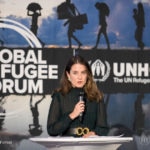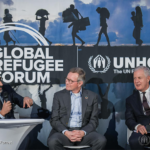What do Albert Einstein and a Venezuelan refugee have in common?
They are both refugees. Einstein, considered one of the greatest geniuses in history, fled Nazi occupied Germany to the United States in 1933 after his civil liberties were revoked and he was barred from his professorship for being an outspoken opponent of the government. Fortunately, Princeton University recognized his intelligence and offered him a job. A fortuitous event that changed his life and ours, yet for many refugees today, such opportunities are scarce.

According to the United Nations Agency for Refugees (UNHCR) data, the world is witnessing the largest movement of people we have seen in history, with over 70 million people forcibly displaced, of which 25 million are refugees. While the drivers of displacement are complex, including poverty and inequality, climate change, violence and conflict, and poor governance, it's clear that the international community and the business sector must act fast to mitigate the devastating and long lasting consequences. As the Secretary General of the United Nations, Antonio Guterres reiterated, “we can't afford to abandon refugees to hopelessness, nor their hosts to bear the responsibility alone. We need international cooperation and practical, effective responses.”
Under the auspices of the first Global Refugee Forum (GRF) that took place in Geneva, Switzerland, the BBVA Microfinance Foundation (BBVAMF), was invited to speak at the GRF Private Sector dinner hosted by UNHCR, Tent Partnership for Refugees (Tent) and the International Chamber of Commerce (IIC). The dinner brought together business leaders to tackle some the issues and opportunities that refugees face, such as education, employability and entrepreneurship. Filippo Grandi, the High Commissioner for Refugees, called on the private sector to be a key player in addressing these challenges, “the business community can help us develop business models, models of work to approach this crisis that are new and more results oriented.”

Filippo Grandi, High Commissioner for Refugees, at the Global Refugee Forum
Over the last decade, in the countries where BBVAMF Group operates, there has been an increase in refugee and migrant activity and the Group is committed to address this crisis. Parallels can be drawn between the experience of the entrepreneurs BBVAMF usually supports and entrepreneurial refugees. For both, launching a business means more than simply having a job and an income. It has the power to instill independence and confidence, and provides them with a sense of belonging in their communities.
Even beyond the frontiers of the countries where the Foundation operates, this is a hard reality for many. For instance, Joanna Ibrahim, a Syrian refugee that relocated to Brazil, gave a powerful testimony during the GRF dinner about starting a business designed to provide culinary training to refugees and immigrants in Brazil so they can learn to cook and sell their dishes. Thanks to her initiative, 13 immigrant families have rebuilt their lives through entrepreneurship. She is an example of how through entrepreneurship she is not only creating a livelihood for herself but she is also helping her community and offering opportunities to others in similar situations.
At a macro level, refugees and migrants can be productive economic actors that can boost the economy of the recipient country as we have seen in Colombia due to the Venezuelan diaspora, according to the International Monetary Fund (IMF). Colombia has received about 1.5 million migrants from Venezuela in the last few years, and thousands more arrive every day. The IMF forecasts that Colombia will grow 3.4% in 2019, faster than Peru, Chile, Brazil, Mexico and Argentina.
The Venezuelan refugee crisis in Colombia is a reality that can´t be ignore, and Bancamia, BBVAMF´s MFI in Colombia understands both its role in addressing this crisis especially since Venezuelans are part of the communities that Bancamía serves and the opportunity that this situation presents since some of Venezuelans are already developing productive activities such as small enterprises.

BBVA Microfinance Foundation has participated in the Global Refugee Forum, organized by UNHCR - UNHCR / Steve Forrest
This past September at Tent’s Latin American Business Summit on Refugees, Bancamia, pledged to provide loans to 200 Venezuelan refugee entrepreneurs by 2020 as part of an initial pilot program. These and more will have access to Bancamia’s financial education program to develop skills that help them create a personal budget, take control of their expenses, and design a savings plan. While this initiative just started, to date, Bancamia has granted nearly $10,000 to 15 Venezuelans and has provided financial education to 300.
In Panama, Microserfin, BBVAMF´s MFI, has been working with UNHCR and the Red Cross since 2008. Currently, they are the only entity in the country disbursing loans to refugees and has served over 300 refugees thus far. They have expanded the program to people who are admitted and awaiting in the refugee application process--a fundamental step in overcoming an immigration barrier and having access to the labor market, through entrepreneurship or an employment. Hamdi Ulukaya, Founder of Tent and CEO of Chobani, couldn’t have expressed it better at the dinner, stressing that 'the minute a refugee gets a job, they stop being a refugee.'

Hamdi Ulukaya, Founder of Tent and CEO of Chobani, Per Heggenes, CEO of IKEA Foundation, John Denton, ICC Secretary General - UNHCR / Steve Forrest
An opportunity for the Private Sector
Thus reinforcing that the business community, as the largest generator of wealth and employment, has the duty of alleviating the refugee crisis by supporting them, especially through hiring them, fostering entrepreneurship and integrating them into their supply chains. Tent was created with this purpose, to mobilize the networks, resources, innovation, and entrepreneurial spirit of the business community to address this problem. An endeavor with a double impact on the lives of these people and on the growth and profitability of companies.
But supporting refugees goes beyond this, because, like Einstein did, they can offer businesses new capabilities, such as creativity and ingenuity. And as in the case of refugee microentrepreneurs, providing financial inclusion is a key to unleashing their potential and success.